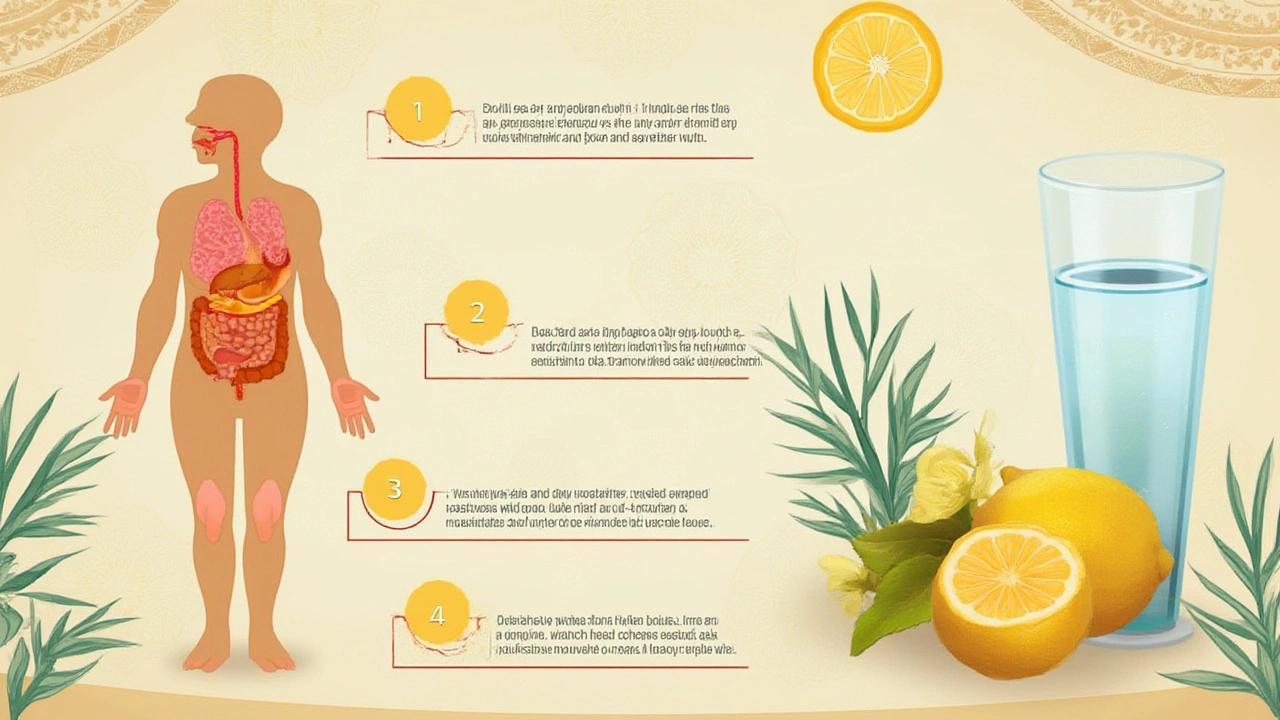
- Jul, 21 2025
- 0
You set your alarm, skipped your usual breakfast, and you’re breezing through the day on nothing but determination and dreams of slimmer jeans. But then, lurking in your kitchen, is that bright yellow fruit—lemon. You start wondering if adding a little lemon to your water will send all your fasting efforts tumbling down. The internet has about a thousand answers, most of them contradictory. Some swear by lemon water as a fasting hack, others say even a drop breaks the rules. What’s really true? Here’s where things finally get clear.
Understanding Fasting: What Breaks a Fast?
Let’s start straight at the heart of the matter. Fasting, at its core, means going without calories for a certain period. People fast for reasons ranging from weight loss to mental clarity and even longevity. When you eat or drink something with calories, technically, that ends your fast—at least from a strict definition.
But not all fasts are created equal. Some folks practice strict water fasts (that means only water—no exceptions!), while others do intermittent fasting where black coffee, tea, and small amounts of calorie-free flavors are allowed. The golden rule for most popular fasting methods (like 16:8 or 18:6 intermittent fasting) is to avoid spiking your insulin or introducing nutrients that start digestion. That’s why black coffee and plain tea are usually okay.
Now, let’s get real. A lot of the drama over what “breaks” a fast comes from what you’re actually trying to achieve. If your goal is weight loss, it’s the calorie count that really matters. If you’re after the potential cellular cleanup (autophagy), even tiny calories might be a big deal. So, before you can decide if lemon water breaks your fast, think about why you’re fasting in the first place.
Lemon Water and Calories: What’s in Your Glass?
If you squeeze half a lemon into your water, how much are you really consuming? Half a medium lemon has about 5-6 calories and a gram or two of carbohydrates. That’s almost nothing compared to even a splash of milk or a few drops of honey. But even a little can add up if your goal is zero calories.
Check out how lemon water compares with common fasting drinks:
| Beverage | Calories per 250ml (1 cup) | Insulin Impact |
|---|---|---|
| Plain water | 0 | None |
| Black coffee | 2 | Very low |
| Green tea (unsweetened) | 2 | Very low |
| Lemon water (half lemon) | 5–6 | Minimal |
| Lemonade (sweetened) | 60–100 | High |
Notice the insulin impact column. That’s the real joker in the pack for fasting. The small amount of carbs in a squirt of lemon is hardly enough to move the needle—too low to cause a major insulin response for most people. In fact, registered dietitians agree that lemon water doesn’t disrupt your blood sugar or yank you out of your fasted state if you keep it small. A 5-calorie glass won’t send your body into digestive mode the way a juice or sports drink would.
And here’s a fun fact: Some animal studies found that the acid in lemon may actually slow stomach emptying and blunt glucose spikes when you finally eat later on. So, it’s not just neutral—it might even help a bit after your fast!

The Science Behind Lemon Water and Fasting
Time to look at what’s actually going on in your body when you drink lemon water during a fast. There hasn’t been a massive clinical trial on "lemon water and fasting" (sorry), but we know a few things based on how the body handles small, zero or near-zero calorie drinks.
Your body starts producing digestive enzymes and insulin if carbs or protein show up. Below a certain threshold (about 10 calories or less), most people won’t break a sweat—or a fast. In fact, Dr. Jason Fung, an expert on intermittent fasting, says that for almost everyone, small amounts of lemon or lime juice in water are fine and don’t disrupt fat burning or autophagy much.
Let’s break down a few common goals and see if lemon water messes with them:
- Fat loss: Those 5 calories won’t make any difference. Your body keeps burning stored fat for fuel as long as you aren’t shoveling in sugar.
- Autophagy (cellular cleaning): Some hardliners say any calories halt this process, but there’s no proof that tiny amounts of citrus juice do serious harm, especially compared to things like bone broth or actual food.
- Blood sugar management: Lemon water might actually help blunt blood sugar spikes later, and it definitely won’t raise them when consumed alone.
- Gut rest: The acid in lemon is small and unlikely to get your gut out of "rest” mode—unless you drink huge quantities.
So, is there a huge difference between plain water and lemon water in a fast? For most people, it’s not worth sweating over. If you’re prepping for a medical fast—like for blood work—always stick to what your doctor tells you, though.
Lemon Water During Fasting: Tips, Benefits, and Pitfalls
Lemon water isn’t just a matter of taste—it’s got a few side perks during fasting as well. For starters, adding lemon can make water way more appealing. When you’re bored of plain water, that tart flavor helps you drink more. Staying hydrated makes fasting much easier and cuts back on headaches, muscle cramps, and those "I feel faint" moments.
Lemon juice also brings a splash of vitamin C. One lemon gives you almost a third of your daily vitamin C needs. While it doesn’t make you immune to colds, vitamin C is an antioxidant and helps your immune system stay on point.
Want to get sneaky with your fast? Here are a few practical tips for using lemon water without breaking your stride:
- Stick with freshly squeezed lemon—none of the packaged stuff, which can pack sugars or preservatives.
- Don’t add honey or sugar. Seems obvious, but many recipes sneak them in.
- Squeeze just enough for flavor. Typically, a quarter to half a medium lemon per 500ml of water is more than enough.
- Try zest or a slice of lemon instead of juice—the calorie count is basically zero, and you still get the aroma.
- If you notice heartburn or sensitive teeth, dial it down. Acidic drinks can be rough on some stomachs and enamel when consumed all day long.
What about “detox”? There’s loads of hype around lemon water flushing out toxins. The truth: your liver and kidneys do the real detoxing. Lemon water helps simply because it keeps you hydrated—nothing magical here, but still useful.
One little pitfall to watch: if you drink gallons of very acidic lemon water, you might notice teeth sensitivity or mild stomach upset. Use a straw—or keep things moderate—if this happens.

Myths, Controversies, and Real-Life Stories
You’ll find every possible answer on internet forums, each one certain they’re right. One camp says lemon water fasts are the "only" way to do it, the other swears even looking at a lemon breaks your fast. Let’s shoot down a few of the biggest myths:
- Myth: “Any calories break a fast!” Reality: For most health and weight-loss goals (not extreme autophagy), 5-10 calories don’t have measurable impacts.
- Myth: “Lemon spikes insulin!” Reality: There’s no science backing the idea that a lemon slice in water does anything to your insulin.
- Myth: “Lemon water gives you superpowers or melts fat.” Reality: No liquid melts fat. Lemon water keeps you hydrated and can help you drink more, which supports fasting indirectly.
- Myth: “You have to use alkaline lemon water for health.” Reality: Adding lemon acidifies water, not makes it more alkaline. The body balances its own pH—lemon water won’t change it outside your stomach.
Plenty of people share online how lemon water made fasting easier. One guy on Reddit said he made it to 36 hours the first time just by having a pitcher of lemon water handy. People often mention less hunger and fewer headaches. That’s no miracle, it’s just staying hydrated and adding a tangy distraction when food cravings come.
Of course, some folks are super strict. Hardcore "biohackers" aiming for maximum autophagy skip everything but pure water. But for the regular person? Lemon water is a safe way to add flavor and a tiny health boost during your fasting window.
If you do notice your body reacts differently, or if your plan is very strict fasting for a medical reason, play it safe and skip it—otherwise, enjoy that refreshing twist. So, the next time you eyeball that lemon, you can grab it guilt-free.
Nikhil Verma
I'm a dedicated physician with a passion for exploring the intricacies of medicine, focusing on the unique healthcare challenges in India. I spend much of my spare time writing articles aimed at improving public understanding of health issues. Balancing my clinical practice and writing allows me to reach a wider audience, sharing insights and fostering a deeper appreciation for medical advancements. I derive immense satisfaction from both treating patients and engaging with readers through my writing.